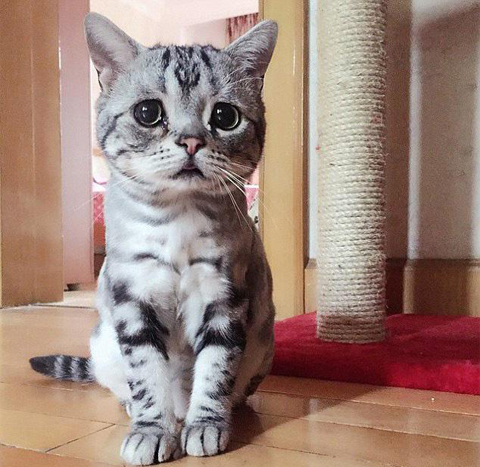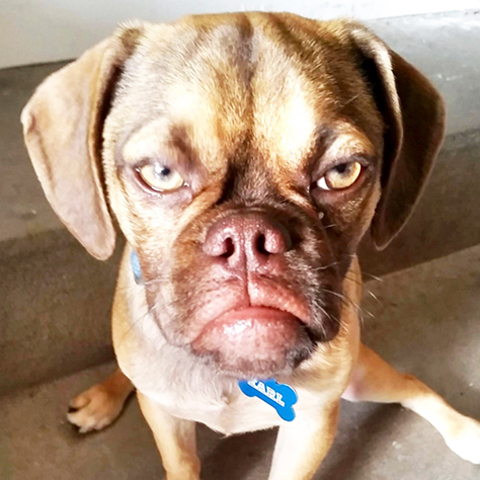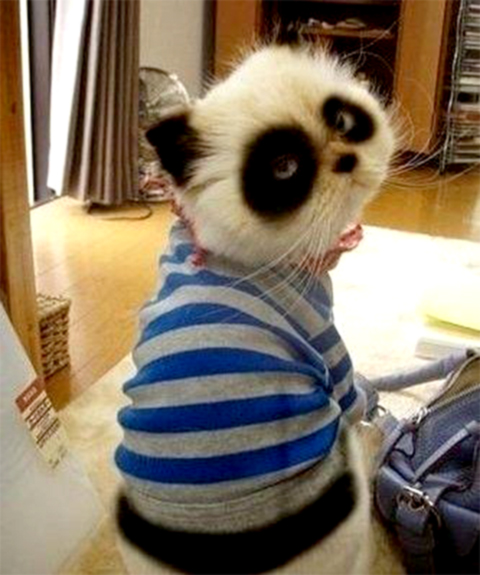Recently, a Chinese cat named Luhu was deemed “the most depressed cat in the world” by many netizens, thanks to the permanently gloomy expression on the feline’s face.

Meanwhile, Grumpy Dog, a pooch from America with an annoyed look, went viral on the internet after its photo was posted on Reddit.

Just as animals are capable of showing a number of emotions, the Chinese language also has countless ways to describe how you’re feeling. Today we will have a look at ten very useful terms.
1. “高兴(gāoxìng)” and “开心(kāixīn)”
The meanings of these two words are nearly the same: “happy” or “joyful.”
They are often used in spoken Chinese and express momentary happiness.
Bié xiǎng tài duō, kāixīn diǎn!
别 想 太 多, 开心 点!
Cheer up! Don’t think too much about it!
Nǐ zhème gāoxìng, yǒu shénme hǎoxiāoxi ma?
你 这么 高兴, 有 什么 好消息 吗?
You look so happy. Do you have some good news?
2. “快乐(kuàilè)” This word, similar to those above, usually means “happy” or “satisfied.” The difference is that “快乐(kuàilè)” often refers to happiness that lasts over a period of time.
Tā guò dé hěn kuàilè!
他 过 得 很 快乐!
He lives a happy life!
Jiérì kuàilè!
节日 快乐!
Happy holidays!

3. “兴奋(xīngfèn)” This word means “excited” or “exciting” in English.
Mǎ Lì: Lǐ Qíng, shénmeshì zhème xīngfèn?
马 丽:李 晴, 什么事 这么 兴奋?
Ma Li: Li Qing, why are you so excited?
Lǐ Qíng: Wǒ bǐsài dé le dìyī!
李 晴: 我 比赛 得 了 第一!
Li Qing: I won first place in the competition!
4. “喜悦(xǐyuè)”
“喜悦(xǐyuè)” shares a similar meaning with the words above, however, it is often used in written language.
Tā nèixīn chōngmǎn xǐyuè.
她 内心 充满 喜悦。
Her heart welled over with joy.
1. “郁闷(yùmèn)” If you feel “郁闷(yùmèn),” it means you feel “depressed.”
Wǒ shǒujī diū le, zhēn yùmèn!
我 手机 丢 了,真 郁闷!
How depressing, I lost my phone!
2. “烦躁(fánzào)”
“烦躁(fánzào)” can be used to let others know you feel “agitated” and “uneasy.”
Lí tā yuǎn diǎn, tā zuìjìn hěn fánzào!
离他 远 点, 他 最近 很 烦躁!
Steer clear of him. He’s been really agitated these days!

3. “忧伤(yōushāng)”This word means that you are “weighted down with sorrow.”
You usually feel “忧伤(yōushāng)”when suffering great frustration and misery.
Qīzi qùshì hòu, tā yìzhí hěn yōushāng.
妻子 去世 后,他 一直 很 忧伤。
He has been distressed since his wife’s death.
4. “不爽(bùshuǎng)”
“不爽(bùshuǎng)” usually refers to a bad mood which is suddenly brought on by the environment or people around you, such as getting yelled at, having someone cut in line in front of you, and so on.
Jīntiān yòu bèi láobǎn mà le, zhēn bùshuǎng!
今天 又 被 老板 骂 了,真 不爽!
God, the boss scolded me again today!
5. “心塞(xīnsāi)”
“心塞(xīnsāi)” means you feel “crushed.”
Xīnsāi a, wǒ shǒujī bèi tōu le!
心塞 啊,我 手机 被 偷 了!
This sucks! My phone has been stolen!
To express our emotions and feelings, we can use the following basic structure: Wǒ + hěn hǎo + adj. 我 + 很/好 + adj. I feel + very/so + adj.
Wǒ jīntiān hěn kāixīn! 我 今天 很 开心! I feel so happy today!
Wǒ zuìjìn hǎo yùmèn. 我 最近 好 郁闷。 I feel very depressed these days.

1. Which of the following is the best way to show your excitement after having successfully passed your driving test?
A. “我很喜悦。(Wǒ hěn xǐyuè.)”
B. “我很兴奋。(Wǒ hěn xīngfèn.)”
C. “我很心塞。(Wǒ hěn xīnsāi.)”
2. Tom’s father passed away last week, so Tom is probably feeing _____ these days.
A. “忧伤(yōushāng)”
B. “不爽(bùshuǎng)”
C. “心塞(xīnsāi)”
Chinese Popular Words (Fun Stuff)
HSK Test
General Chinese (Beginner Level)
General Chinese (Intermediate Level)



